Age is just a number: How this 78-year-old became the oldest woman to finish the Ironman World Championship
Cherie Gruenfeld made history in Kona … but it was far from easy
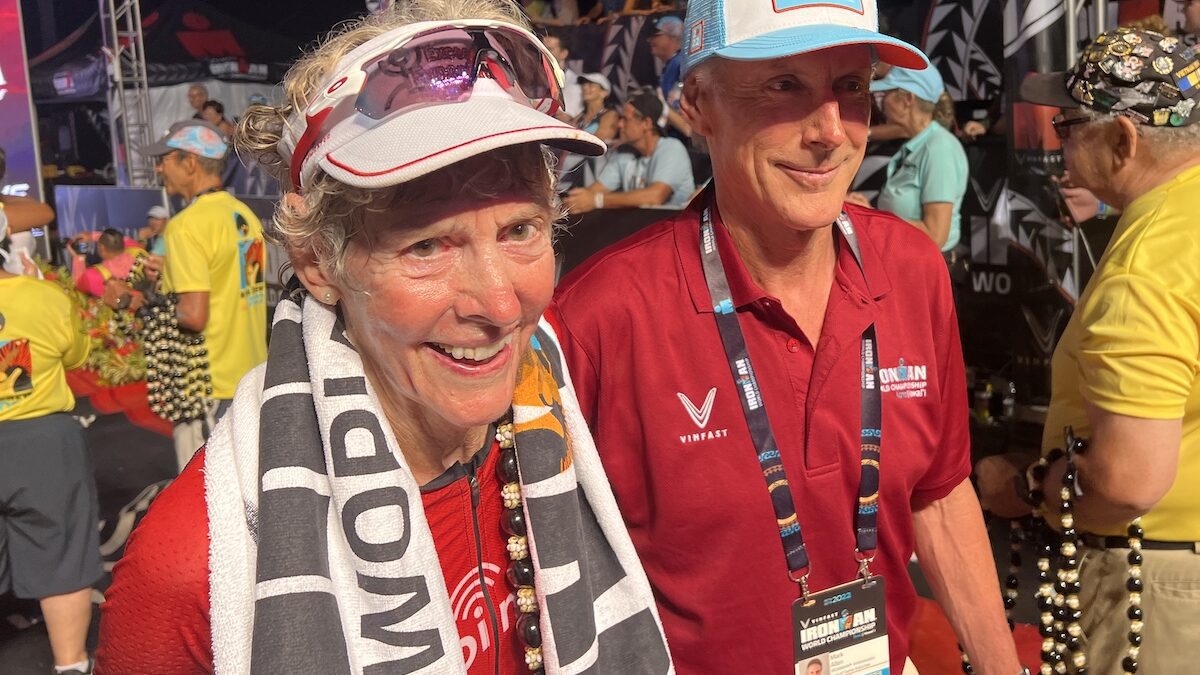 Photo by:
Lee Gruenfeld
Photo by:
Lee Gruenfeld
First off, asking me to write about my wife Cherie is like asking a cop to write about doughnuts: I could go on singing her praises forever and bore you into delirium. So please take that into consideration.
A little background. Thirty years ago, Cherie threw her three university degrees and an executive position in the artificial intelligence industry into the dumpster to become a full-time amateur triathlete.
That wasn’t the plan. The plan was to take a one-year sabbatical, do one Ironman triathlon, and then go back to work. But when she came across the finish line in Kona in 1992, I took one look at her face, turned to her brother and said (this is verbatim), “That broad ain’t never going back to work.”
She placed ninth in her age group that year, sixth the next, and won it in 1994. A few years later she became the first female over 55 to break twelve hours, and by 2015 she’d raced in Kona 22 times and won 13 world titles. At that point, she hung it up and retired from the long course, but went on to win dozens of 70.3 races, including four world championships.
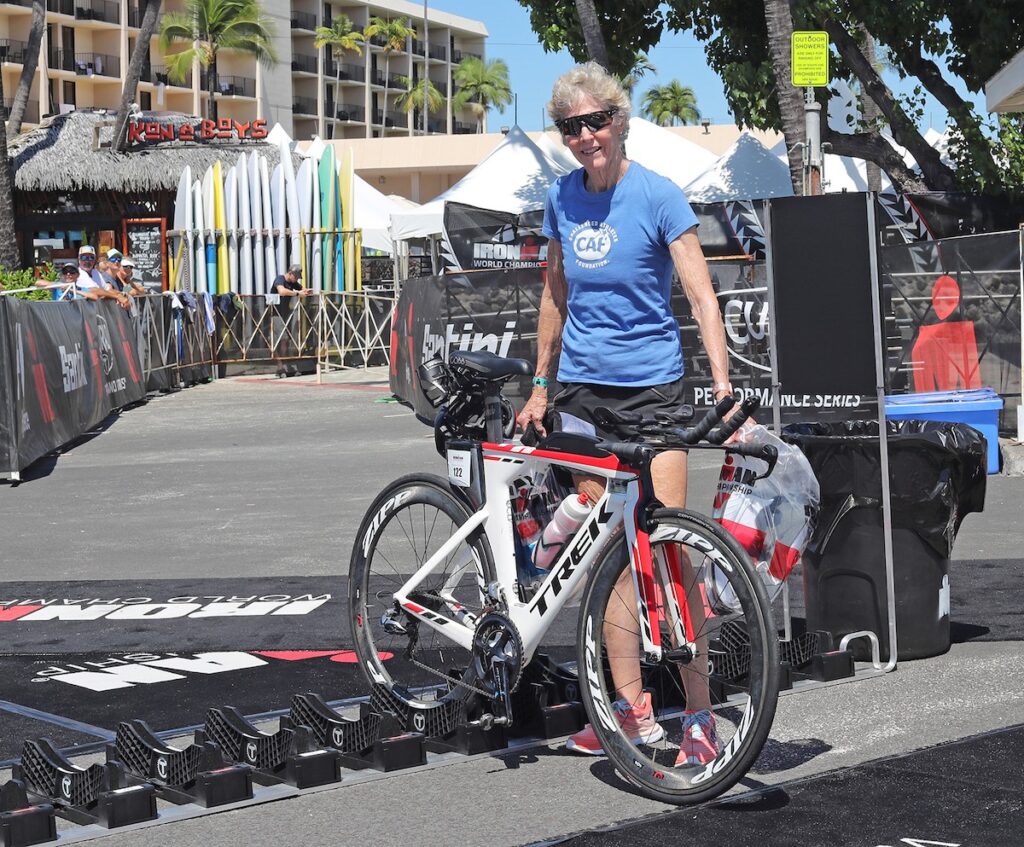
That retirement decision was final and absolutely drop dead certain. But, in 2019, she turned 75, and there was an age group record in 75 to 79 that had stood for 14 years. That historic mark was like a piece of raw filet dangling in front of a hungry Rottweiler. She qualified, took the slot and trained.
And in the July before the race, she got hit with two cancers at the same time, one of which was actually the long-term consequence of a ten-year old cycling injury. Two surgeries in September annoyingly interfered with her training and put Kona on the back burner, but she got right back in the saddle (literally) with an eye on 2020. She trained full bore throughout November while undergoing five days a week of radiation treatments.
She was back in full form just about the day the pandemic started. Kona 2020 was canceled, but she kept at it, getting ready for the following year. Then the 2021 race was canceled. She wondered if maybe the cosmos was trying tell her something, but she told the cosmos to **** off and kept training.
Then it was 2022, and she was 78. Those of you who don’t think there’s much difference in athletic ability between 75 and 78 have never been 75 or 78.
Related: Triathlon’s diversity challenge – Cherie Gruenfeld inducted into USA Triathlon Hall of Fame
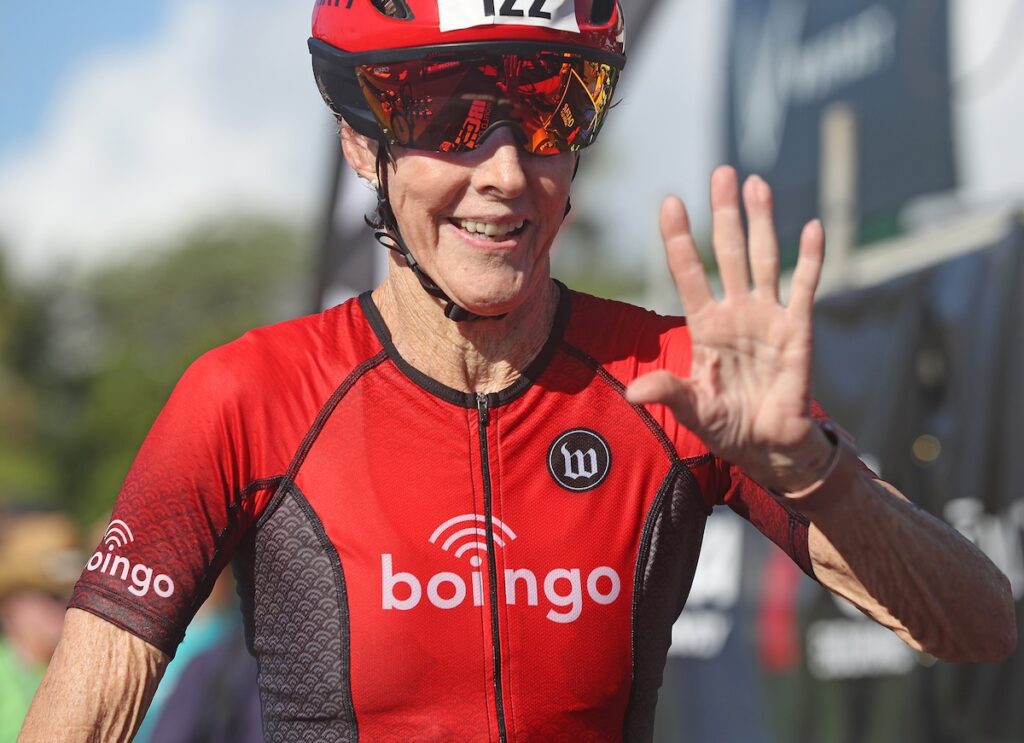
We live in the desert in Southern California, so training all summer long meant starting before dawn each day when it was only 38°C. (By noon, 55°C wasn’t unusual.) When asked what it’s like to train in those conditions, her response is NSFW, but translates roughly as, “Golly, this heat is a bit uncomfortable. I shall be so grateful when the day’s work is done.”
She decided to do it anyway. The world record was no longer possible, and she would be up against three excellent competitors, including two who had won in Kona while Cherie was “retired,” and they were all younger (see above). Now she just wanted to have a good, definitely last race. And, by the way, if she finished, she’d be the oldest female ever to complete the world championship course. So there’s that.
The swim went well. She was anticipating 1:40 but exited the water at 1:30 feeling loose and revved up. One of her competitors was, not unexpectedly, seven minutes ahead. That woman was also a stronger cyclist, so the race was on for second place.
During the day, I occasionally* glanced at the tracking information. (*every 17 nanoseconds). Cherie’s and the leader’s bike splits through the first bunch of tracking sectors were virtually identical.
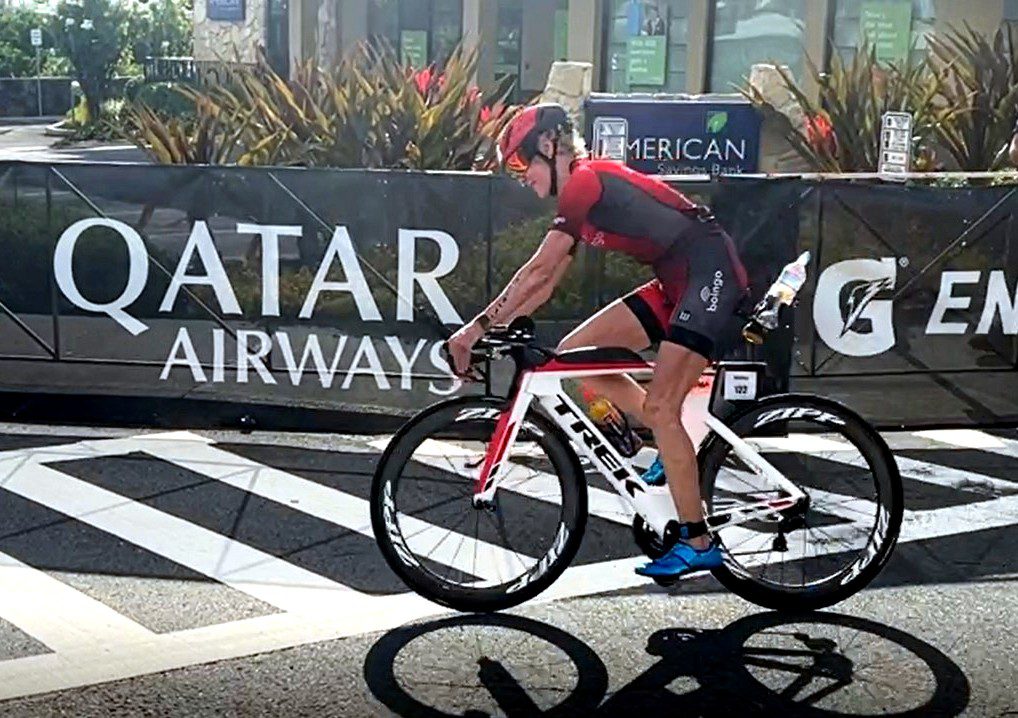
Then an odd thing started happening. The leader’s pace was slowing down, and Cherie’s was speeding up. By the time they got to T2, Cherie was well over an hour ahead of her. As we would learn, the competitor never started the run. And, at the 123 km mark, a second one dropped out.
Even so, it was far from over. The other competitor still left in this age group was Natalie Grabow, an accomplished and talented long-distance triathlete whom Cherie had competed against for years. In 2015, she led the race from the 40 km point of the bike. With five miles to go, she was half a mile ahead of second-place Cherie, who somehow found another gear and started scraping away at the lead. At the top of Palani Road, with only 2 km to go, Cherie passed her and got her 13th win. Six-time world champion Mark Allen called it one of the 100 greatest moments in Ironman history.
And then, like I said, she retired. Natalie came back the following year and got the well-deserved world title.
Natalie was back this year, as hungry and determined as ever, and got off the bike only 17 minutes behind Cherie.
I had planned to make this year’s race an easy one on me. Tool around in the car, intercepting Cherie here and there to wave encouragement as road closures permitted, and generally munching Pringles and slurping Arnold Palmers while listening to tunes and snapping shots of the clouds and the occasional athlete.
But now my wife was in first place, which I hadn’t planned on, and she was being chased by a very tough competitor. So I decided maybe I’d better pay a little more attention.
At every timing mat her lead increased, so I started to relax again and stopped at a gas station to restock my Pringles. As I walked out, I got a call from my nephew in New York.
“I don’t know if you realize this,” he said, “but if Auntie can carry a 15:10 per mile [9.5 per km] pace to the finish, she’ll break the world record.”
What? “What’s she been running?” I asked.
A pause as I heard some keys clicking. “Last three timing sectors, about 13:30, 13:40 [8:30, 8:50 per km].”
WHAT?
I caught her at the “hot corner,” about 12 km into the run, and gave her the news. She nodded and started up the steep hill to the Queen K Highway.
At the Energy Lab entrance, she’d built her lead to 44 minutes. At the exit, it was 54 minutes. This might not seem very important, but, hang on a minute.
She was now on pace the break the record by about 40 minutes. It was one of the longest-standing records in the sport, 15:54 set in 2005 by Sister Madonna Buder (at age 75; see above).
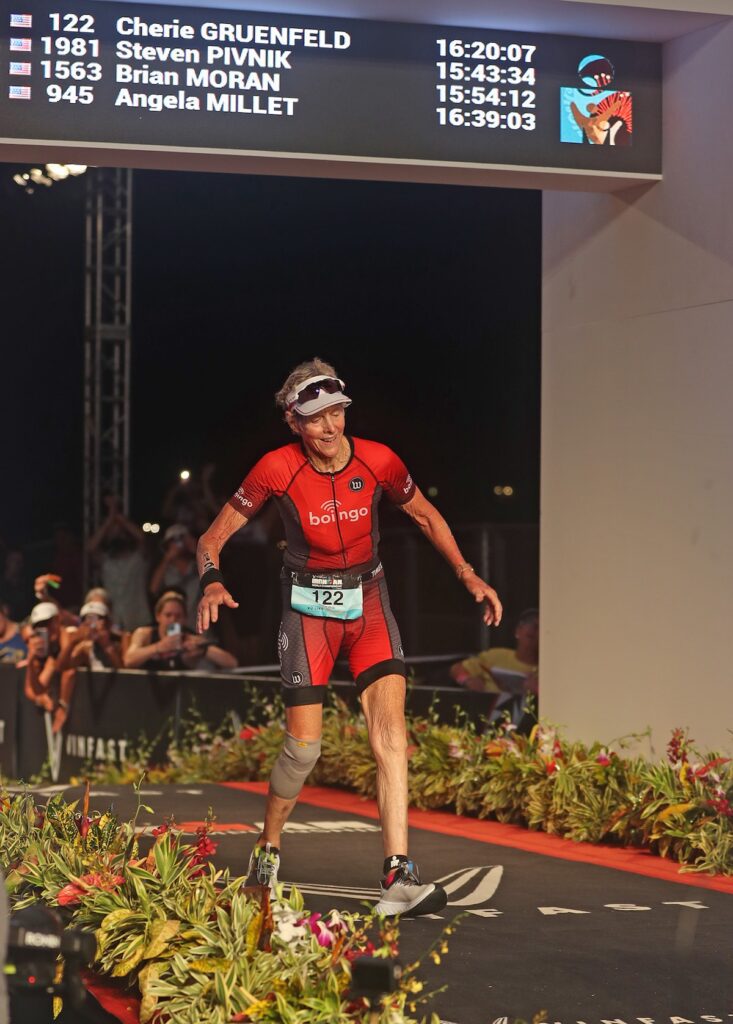
I waved goodbye and headed back to town. When I got to the hot corner, about 1.3 km from the finish, I was immediately accosted by some friends.
“Did something happen to Cherie?” one of them asked.
“What do you mean?”
He held up the tracker. Cherie’s times had deteriorated drastically. Normally, she negative splits the last few miles, but not only was she not doing that, her pace looked more like a crawl than a run.
What I wouldn’t find out until later was that her back had spasmed at about the 21-mile mark. Nothing like that had ever happened to her, so at first she didn’t know what it was, only that it was excruciating. Bent over sideways, she was hobbling from telephone pole to street sign, grabbing on to help her stay upright.
It was no longer about the world record, or even first place. It was all about getting to the finish line. Cherie had only DNF’d once in her life, during a sprint triathlon in 1995 when the handlebars literally fell off her bike.
Every step was agony. She was willing to work through the pain, but she wasn’t certain her back wouldn’t give out altogether and send her to the pavement.
From 41 km to 42 km her pace was down to half the speed of smell, over 21 minutes per km.
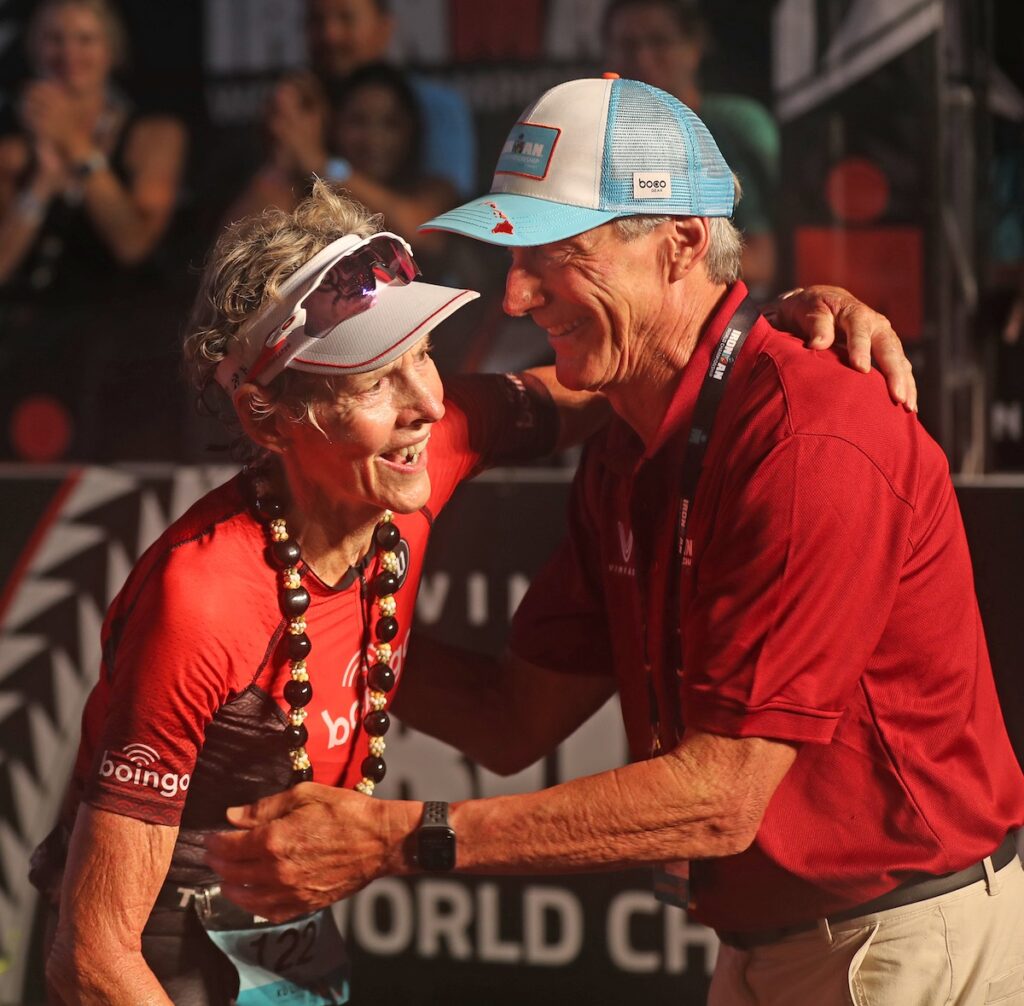
She hit the last turn onto Ali’i Drive, with 0.3 km to go, absolutely determined to cross the line standing as straight as physically possible and smiling. When she did, the clock above her head said 16:20:07.
She indeed became the oldest finisher ever, and here’s where that big lead she’d built becomes important. She wound up winning by 28 minutes for her 14th world title.
See? This is what happens when you let me brag about my wife.
Lee Gruenfeld is a best-selling author who co-wrote Mike Reilly’s recent book: Finding My Voice. This story originally appeared in the November issue of Triathlon Magazine.
